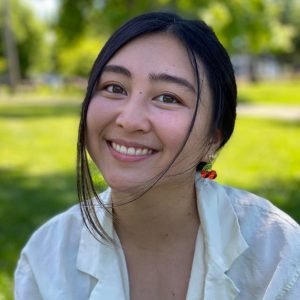WWU grad student (now alumna) Jackelyn Garcia named the 2023 Washington Sea Grant Keystone fellow
After finishing her master's degree in Marine and Estuary Science at Western and graduating in June, Jackelyn Garcia is starting her new "summer job" as the 2023 Washington Sea Grant Keystone Fellow.
Garcia will work with the Puget Sound Partnership and Washington Conservation Action to do a wide range of work focused on environmental policy.
“I’m really excited to meet all sorts of people and get to learn what their career path was like,” Garcia said. “I find it interesting and inspiring to hear what other people’s journeys."
The fellowship works to broaden overall participation in marine science and relevant fields through the recruitment of people underrepresented in marine science and policy while providing mentorship.
“I felt the fellowship experience would be really unique, because it has mentorship embedded in the experience,” Garcia said. “I wanted the chance to learn from all these people while still having that chance for professional development.”
Garcia will work with the Puget Sound Partnership’s Puget Sound Acquisition and Restoration program (PSAR), which is focused on restoration projects around salmon health and recovery. Garcia’ will follow up with restoration programs and agencies that PSAR has funded has funded and determine how well they have done meeting their objectives.
Garcia will also work with the Washington Conservation Action and the Salish Sea Collective to hold the Salish Sea Equity and Justice Symposium, which focuses on environmental justice and how to tackle various environmental inequities.
Environmental work isn't just the restoration of physical habitat, but it can be the restoration or conservation of people’s languages or cultural identities related to the restoration of that land.
Jackelyn Garcia
Garcia said she is no stranger to fellowships, as she was awarded a prestigious Doris Duke Conservation Fellowship as an undergraduate at UW Bothell in 2018. That fellowship experience inspired her to pursue community-based work and the ways natural science can be intertwined with people.
“One of the big reasons I really wanted to pursue a fellowship was because of the chance to really get to know people and the kind of work they’re doing in the environmental field,” Garcia said.
Garcia said she is still unsure what she is interested in doing in the future, but knows she is passionate about community-based work that connects cultural and community values to the environment.
“I don’t fully know what I want to do, but I want to pursue opportunities that combine analytical science with community and cultural values,” Garcia said. “That intersection is something I’ve really enjoyed working in.”
Garcia said she hopes the Keystone Fellowship will add to her understanding of how a career in the environment can help communities, their residents, and their cultures.
“Environmental work isn't just the restoration of physical habitat, but it can be the restoration or conservation of people’s languages or cultural identities related to the restoration of that land,” Garcia said. “I think that idea of conservation really shifted and transformed and motivated me to pursue a master's degree and think about how environmental work doesn’t just focus on the natural science, but it can also focus on how it is intertwined with people, community and cultural values."
Garcia said the fellowship includes a stipend for professional development opportunities and other ways to grow her career.
When considering advice for future applicants, Garcia said anyone who is interested in environmental work should apply for opportunities that allow them to grow and gain new knowledge that ties to their passions.
"The worst thing any fellowship can do is just say no," she said.
Find out more about Western's Marine and Estuary Science graduate program here.
